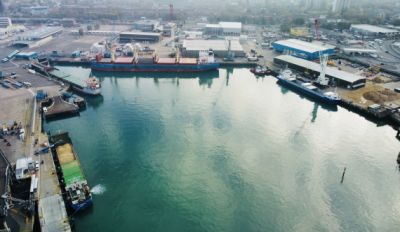Archives
Feature, Freight News, Sea
Strength in diversity for Portsmouth
[ November 11, 2021 // Chris ]The Portico’s cargo terminal at Portsmouth International Port has been handled a wide range of cargoes with paper, agribulks, containers and project cargo all passing through during November.
The operator said this was testimony to its successful diversification strategy to drive new types of cargo to Portsmouth, including paper being unloaded at the terminal for the first time. Some 22,000 pallets of printer paper were unloaded from the Ansac Pride, for distribution across the UK.
The terminal also welcomed the Karoline, carrying 36 large steel pipes for the HS2 project, and reinforces Portico’s bid to break into the project cargo sector with its direct links to the motorway network as well as proximity to the main shipping lanes. Portico has invested in mobile harbour cranes which can handle tandem lifts of up to 250 tonnes.
Two vessels also loaded over 7,000 tonnes of agribulks for export to continental Europe, using spare berth capacity whilst Portico’s conventional berths have been occupied by other customers. This includes the regular Musketier lo-lo service to the Channel Islands operated by Ferryspeed.
Operations director at Portico, Steve Williams, said: “Over the past few years we’ve continued to diversify the types of cargo we can handle here at the terminal. The investments we have made alongside our dedicated workforce mean that we are incredibly flexible.
“We can move from handling containers to specialist project cargo in the blink of an eye, and being next to the M275 means that freight can be on the road in minutes”.
Cllr Gerald Vernon-Jackson, Leader of Portsmouth City Council, which owns Portico added: “I’m delighted to see Portico continue to establish themselves as a multi-use terminal which can be used for a wide range of vessels.
“In terms of CO2 emissions per tonne of cargo transported one kilometre, shipping is recognised as the most efficient form of commercial transport. So, by shifting cargo from road to the sea and getting it closer to where it needs to be using regional terminals like Portico, offers significant environmental benefits.”

Tags: Portsmouth; Portico














